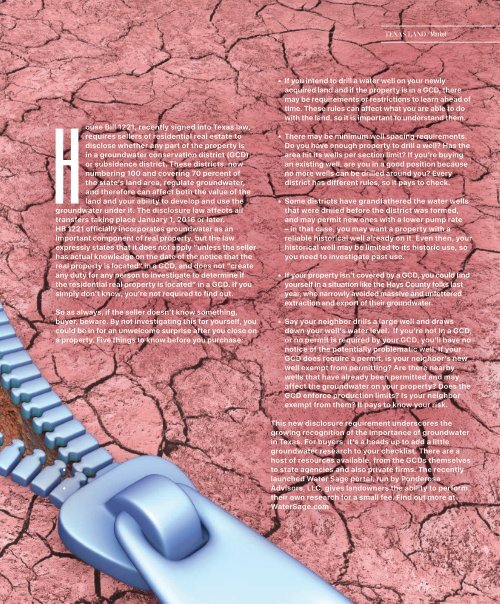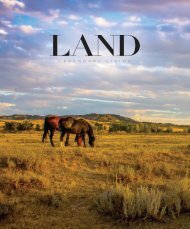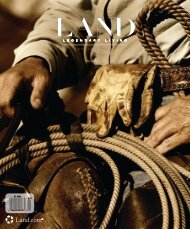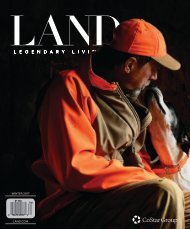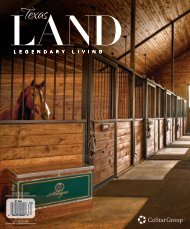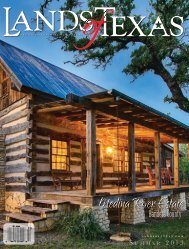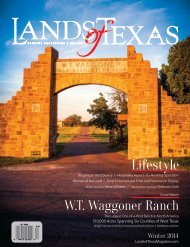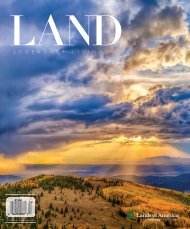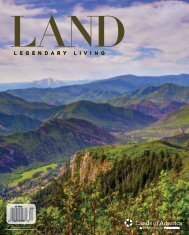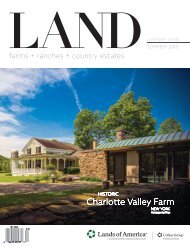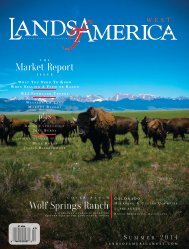Create successful ePaper yourself
Turn your PDF publications into a flip-book with our unique Google optimized e-Paper software.
TEXAS LAND / Market<br />
House Bill 1221, recently signed into Texas law,<br />
requires sellers of residential real estate to<br />
disclose whether any part of the property is<br />
in a groundwater conservation district (GCD)<br />
or subsidence district. These districts, now<br />
numbering 100 and covering 70 percent of<br />
the state’s land area, regulate groundwater,<br />
and therefore can affect both the value of the<br />
land and your ability to develop and use the<br />
groundwater under it. The disclosure law affects all<br />
transfers taking place January 1, <strong>2016</strong> or later.<br />
HB 1221 officially incorporates groundwater as an<br />
important component of real property, but the law<br />
expressly states that it does not apply “unless the seller<br />
has actual knowledge on the date of the notice that the<br />
real property is located” in a GCD, and does not “create<br />
any duty for any person to investigate to determine if<br />
the residential real property is located” in a GCD. If you<br />
simply don’t know, you’re not required to find out.<br />
So as always, if the seller doesn’t know something,<br />
buyer, beware. By not investigating this for yourself, you<br />
could be in for an unwelcome surprise after you close on<br />
a property. Five things to know before you purchase:<br />
•<br />
•<br />
• If you intend to drill a water well on your newly<br />
acquired land and if the property is in a GCD, there<br />
may be requirements or restrictions to learn ahead of<br />
time. These rules can affect what you are able to do<br />
with the land, so it is important to understand them.<br />
• There may be minimum well spacing requirements.<br />
Do you have enough property to drill a well? Has the<br />
area hit its wells per section limit? If you’re buying<br />
an existing well, are you in a good position because<br />
no more wells can be drilled around you? Every<br />
district has different rules, so it pays to check.<br />
• Some districts have grandfathered the water wells<br />
that were drilled before the district was formed,<br />
and may permit new ones with a lower pump rate<br />
– in that case, you may want a property with a<br />
reliable historical well already on it. Even then, your<br />
historical well may be limited to its historic use, so<br />
you need to investigate past use.<br />
• If your property isn’t covered by a GCD, you could find<br />
yourself in a situation like the Hays County folks last<br />
year, who narrowly avoided massive and unfettered<br />
extraction and export of their groundwater.<br />
• Say your neighbor drills a large well and draws<br />
down your well’s water level. If you’re not in a GCD,<br />
or no permit is required by your GCD, you’ll have no<br />
notice of the potentially problematic well. If your<br />
GCD does require a permit, is your neighbor’s new<br />
well exempt from permitting? Are there nearby<br />
wells that have already been permitted and may<br />
affect the groundwater on your property? Does the<br />
GCD enforce production limits? Is your neighbor<br />
exempt from them? It pays to know your risk.<br />
This new disclosure requirement underscores the<br />
growing recognition of the importance of groundwater<br />
in Texas. For buyers, it’s a heads up to add a little<br />
groundwater research to your checklist. There are a<br />
host of resources available, from the GCDs themselves<br />
to state agencies and also private firms. The recently<br />
launched Water Sage portal, run by Ponderosa<br />
Advisors, LLC, gives landowners the ability to perform<br />
their own research for a small fee. Find out more at<br />
WaterSage.com<br />
LANDMAGAZINES.COM<br />
93


